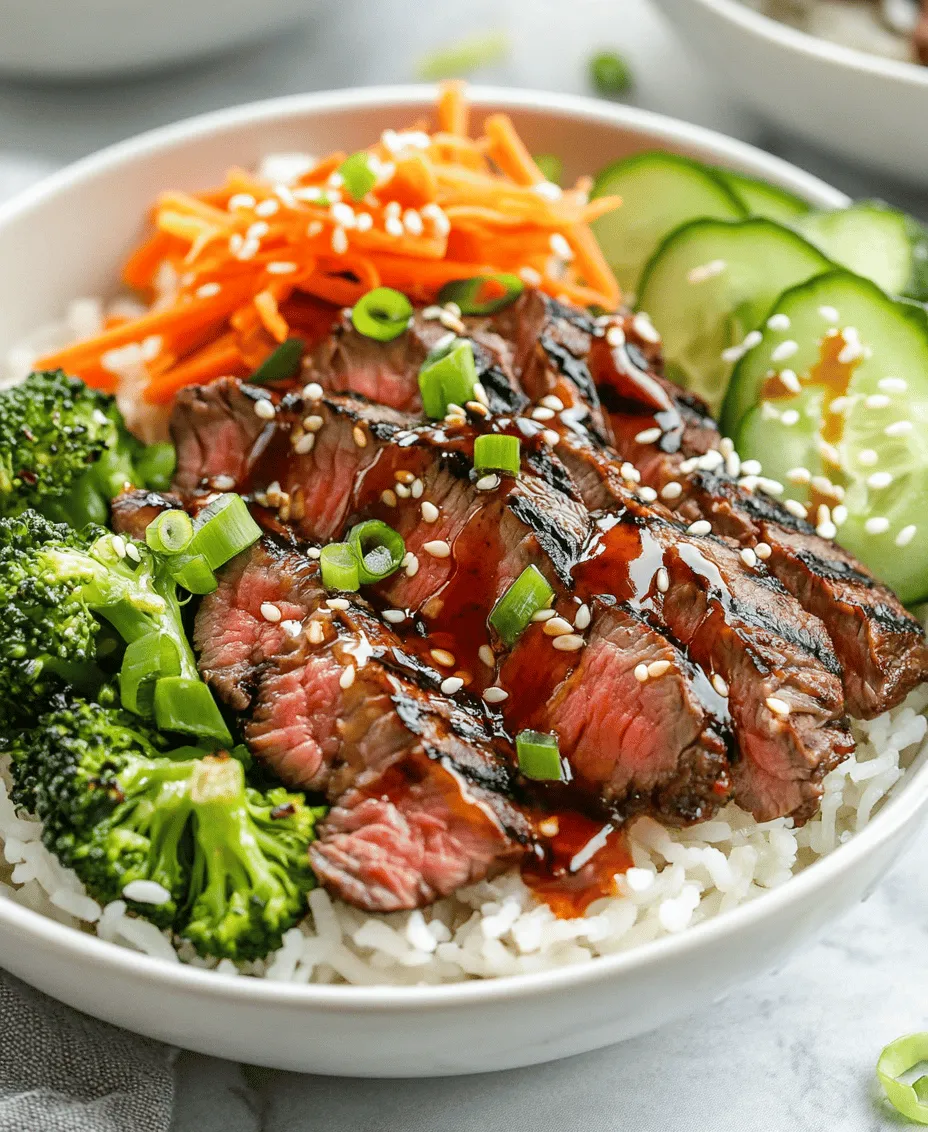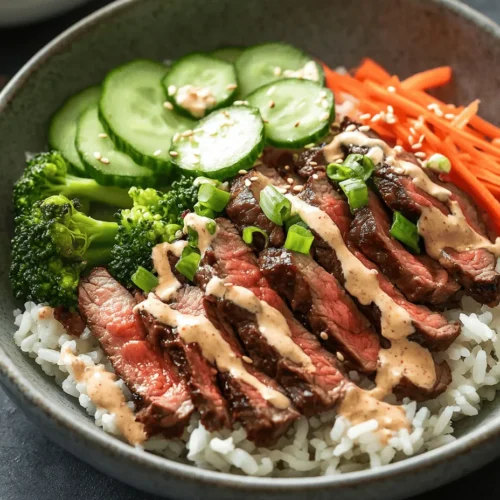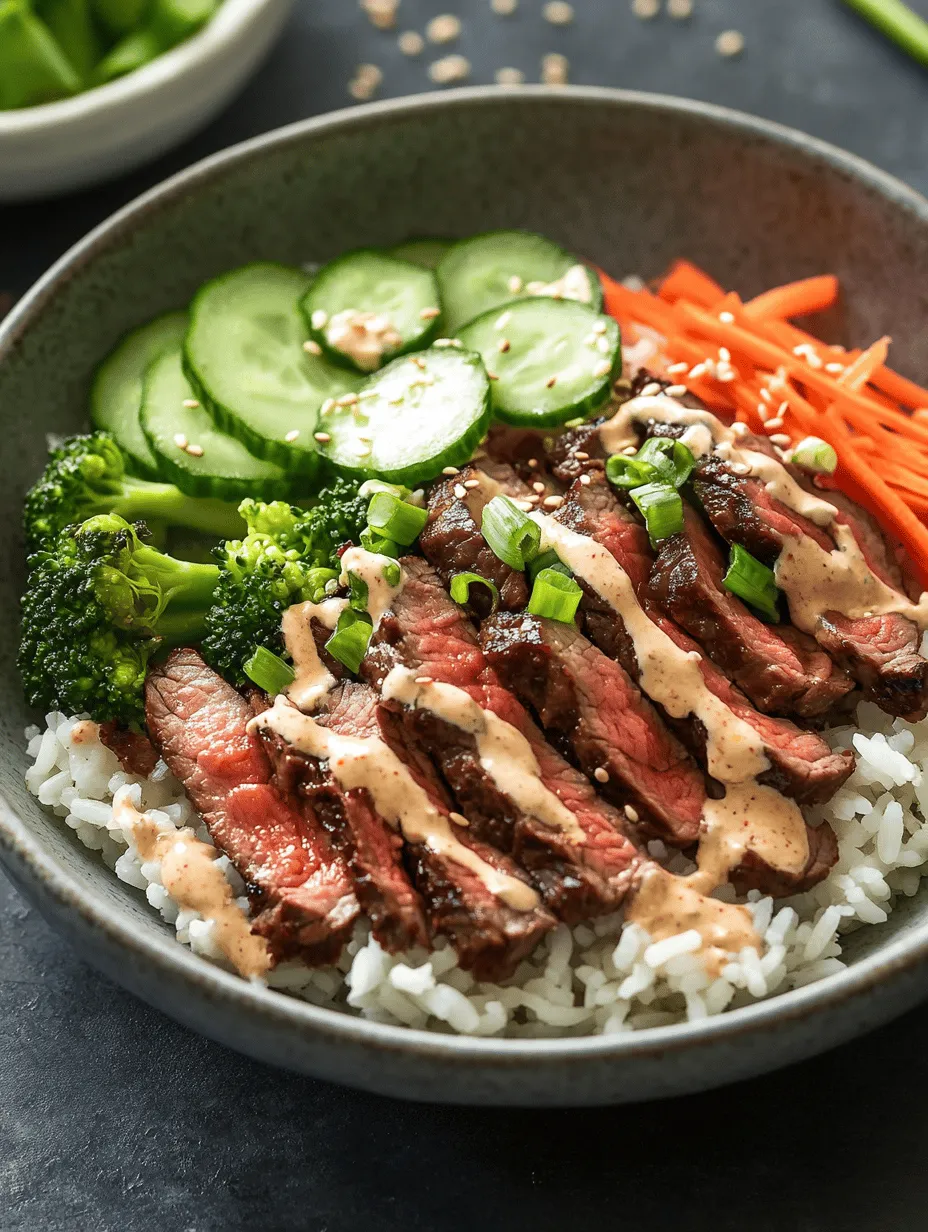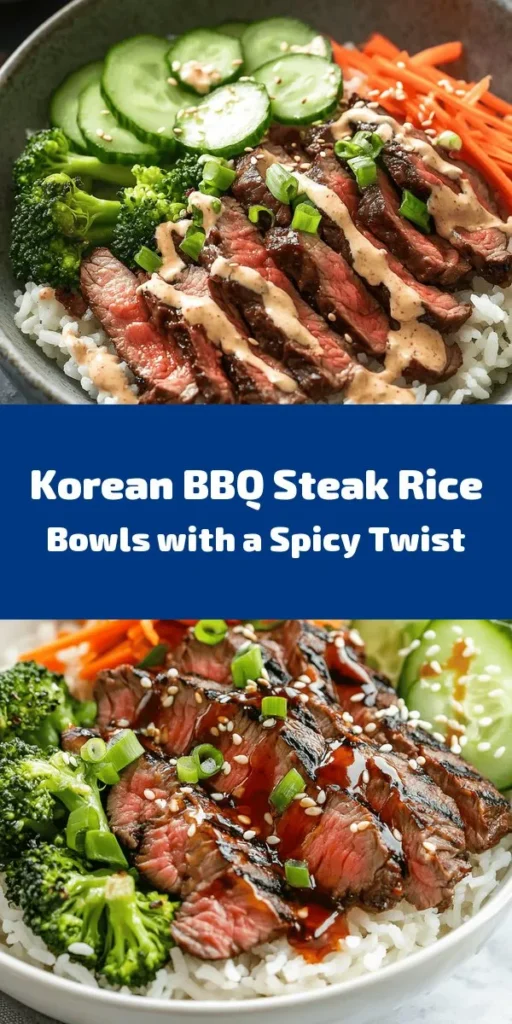Introduction to Korean BBQ Steak Rice Bowls with Spicy Cream Sauce
Embark on a culinary journey to Korea with this delightful recipe for Korean BBQ Steak Rice Bowls, topped with a zesty spicy cream sauce. This dish marries savory marinated steak with fresh vegetables and creamy sauce, offering a harmonious balance of flavors and textures. Perfect for a weeknight dinner or a gathering with friends, these rice bowls are easy to prepare and can be customized to suit your taste. In this article, we’ll explore each component of the recipe, providing step-by-step instructions and insights into the ingredients that make this dish special.
Korean BBQ has gained immense popularity around the globe, celebrated for its robust flavors and communal dining experience. The essence of Korean cuisine lies in its ability to blend sweet, spicy, and savory elements, often accompanied by a variety of fresh vegetables. Korean BBQ Steak Rice Bowls encapsulate this philosophy, offering a vibrant meal that can be effortlessly adapted to suit personal preferences. With the added zing of a spicy cream sauce, this dish transforms a simple dinner into a flavorful feast.
Understanding the Components of Korean BBQ Steak Rice Bowls
To create the perfect Korean BBQ Steak Rice Bowl, it is essential to understand the various components that contribute to its deliciousness. Each ingredient plays a vital role in enhancing the overall flavor profile and texture of the dish, making it not just a meal but an experience. Let’s dive into the key components: the rice base, the marinated steak, fresh vegetables, and the spicy cream sauce.
The Base: Understanding Jasmine Rice and Its Role
Jasmine rice is the perfect foundation for any stir-fry or rice bowl, especially in a Korean BBQ dish. Known for its subtly nutty flavor and fragrant aroma, jasmine rice is a long-grain variety that pairs beautifully with savory meats and rich sauces. The light, fluffy texture of jasmine rice complements the dense flavors of marinated steak, allowing each bite to be balanced and satisfying.
When preparing jasmine rice, it’s crucial to follow a few simple cooking tips to ensure it turns out perfectly:
1. Rinse the rice: Before cooking, rinse the jasmine rice under cold water to remove excess starch. This helps prevent the rice from becoming overly sticky and ensures a light, fluffy texture.
2. Water-to-rice ratio: For every cup of jasmine rice, use 1.5 cups of water. This ratio allows the rice to absorb just enough moisture without becoming mushy.
3. Cooking method: Whether you choose to cook jasmine rice on the stovetop, in a rice cooker, or in the microwave, make sure to bring the water to a boil before reducing the heat to a simmer. Cover the pot and let it cook undisturbed for about 15 minutes. Afterward, let the rice sit covered for an additional 10 minutes before fluffing with a fork.
The Star Ingredient: Marinated Steak
The centerpiece of the Korean BBQ Steak Rice Bowl is undoubtedly the marinated steak. Choosing the right cut of meat is critical for achieving tenderness and flavor. Two popular options are flank steak and ribeye, each offering unique characteristics:
– Flank steak: This cut is lean and flavorful, making it a popular choice for Korean BBQ. When properly marinated and sliced against the grain, flank steak becomes incredibly tender, absorbing the marinade’s flavors beautifully.
– Ribeye: Known for its marbling and rich flavor, ribeye steak offers a juicy and succulent bite. While it may be a bit pricier, the tenderness and flavor make it worth the investment for a special occasion.
Importance of Marinating for Flavor and Tenderness
Marinating the steak is essential for infusing it with flavor and ensuring tenderness. A well-crafted marinade typically includes ingredients like soy sauce, sesame oil, garlic, and ginger. These components work together to enhance the natural flavors of the meat while also breaking down tough fibers, resulting in a more enjoyable bite.
Breakdown of Marinade Ingredients and Their Roles
– Soy sauce: Acts as the primary seasoning, providing umami and saltiness.
– Sesame oil: Adds a rich, nutty flavor that is characteristic of Korean cuisine.
– Garlic and ginger: These aromatics contribute depth and warmth, enhancing the overall flavor profile of the marinade.
– Sugar (or honey): Balances the savory elements and adds a touch of sweetness, helping to caramelize the meat during cooking.
For optimal flavor absorption, marinate the steak for at least 30 minutes, though several hours or overnight is ideal for deeper flavor penetration. Ensure the steak is thoroughly coated in the marinade and refrigerate it during this time.
The Colorful Veggies: Fresh Ingredients
A vibrant array of vegetables not only enhances the visual appeal of the Korean BBQ Steak Rice Bowl but also boosts its nutritional value. Fresh vegetables such as broccoli, carrots, and cucumbers provide essential vitamins and minerals, along with a satisfying crunch.
The Nutritional Benefits of Broccoli, Carrots, and Cucumbers
– Broccoli: Packed with vitamins C and K, broccoli is a powerhouse of nutrients and antioxidants. Its fibrous texture adds a hearty bite to the dish.
– Carrots: Rich in beta-carotene, carrots lend a natural sweetness and vibrant color that brightens up the bowl. They are also a good source of fiber and vitamin A.
– Cucumbers: With their refreshing crunch and high water content, cucumbers provide a cooling contrast to the savory flavors of the steak and sauce. They are also low in calories, making them a perfect addition for those looking to maintain a balanced diet.
How to Prepare and Steam Vegetables for the Best Texture
To maintain the vibrant colors and nutritional integrity of the vegetables, steaming is an excellent cooking method. Here’s how to prepare them:
1. Broccoli: Cut the broccoli into bite-sized florets. Steam for about 3-4 minutes until bright green and tender but still crisp.
2. Carrots: Peel and slice the carrots into thin rounds or matchsticks. Steam for 2-3 minutes until they are just tender.
3. Cucumbers: These can be served raw. Simply wash and slice them into thin rounds or julienne strips for an appealing texture.
Feel free to experiment with additional vegetables like bell peppers, snap peas, or green onions. Each addition can offer unique flavors and textures, allowing for a personalized touch to your rice bowl.
The Creamy Kick: Spicy Cream Sauce
No Korean BBQ Steak Rice Bowl is complete without a delicious, spicy cream sauce that ties all the elements together. The star of this sauce is gochujang, a Korean chili paste that is both spicy and slightly sweet, making it a staple ingredient in Korean cooking.
Explanation of Gochujang and Its Significance in Korean Cuisine
Gochujang is a fermented chili paste made from red chili powder, glutinous rice, fermented soybeans, and salt. Its complex flavor profile adds depth to any dish, making it an essential component in marinades, stews, and sauces. Not only does gochujang provide heat, but it also brings a rich umami flavor that enhances the overall dish.
The Balance of Flavors in the Sauce
To create a balanced spicy cream sauce, the gochujang is typically combined with ingredients like mayonnaise, sour cream, or Greek yogurt, depending on your preference for creaminess. This combination allows the heat from the gochujang to meld with the creaminess of the sauce, creating a delightful contrast that elevates the entire bowl.
Variations of the Sauce for Different Spice Levels
One of the great things about the spicy cream sauce is its versatility. If you prefer a milder sauce, simply reduce the amount of gochujang and add more creamy ingredients to balance the heat. For those who crave extra spice, consider adding a dash of sriracha or a sprinkle of red pepper flakes for an added kick.
Step-by-Step Guide to Preparing Korean BBQ Steak Rice Bowls
Marinating the Steak: Essential Techniques
Now that we have a deeper understanding of each component, let’s move on to the practical steps involved in preparing Korean BBQ Steak Rice Bowls. The first critical step is marinating the steak, which sets the foundation for the dish’s flavor.
1. Choose your steak: Decide between flank steak or ribeye based on your personal preference and budget.
2. Prepare the marinade: In a bowl, combine soy sauce, sesame oil, minced garlic, grated ginger, and sugar. Whisk until well combined.
3. Marinate the steak: Place the steak in a resealable plastic bag or a shallow dish. Pour the marinade over the steak, ensuring it is evenly coated. Seal the bag or cover the dish and refrigerate for at least 30 minutes, though several hours or overnight is ideal.
4. Remove excess marinade: When ready to cook, remove the steak from the marinade and let it sit at room temperature for about 10-15 minutes. This helps to ensure even cooking.
5. Cook the steak: Heat a grill pan or skillet over medium-high heat. Cook the steak for about 4-5 minutes per side for medium-rare, adjusting the time based on your preferred doneness. Once cooked, allow the steak to rest for a few minutes before slicing it against the grain into thin strips.
As we progress through this recipe, you will see how each component comes together to create a satisfying and delicious meal. From the perfectly marinated steak to the vibrant vegetables and creamy sauce, Korean BBQ Steak Rice Bowls are sure to impress anyone who tries them. Stay tuned for the next section where we will delve into assembling the rice bowls with all the delicious components!

Tips for Selecting the Right Container for Marinating
Choosing the right container for marinating your steak is crucial to achieving maximum flavor infusion. Here are key considerations:
1. Material: Opt for glass or food-safe plastic containers. Avoid metal containers as they can react with acidic marinades, altering the flavor of your dish.
2. Size: Choose a container that allows the steak to be fully submerged in the marinade. A shallow dish can work, but a zip-top bag is often the best option, as it minimizes excess air and ensures even coverage.
3. Sealability: If using a bag, ensure that it seals tightly to prevent any leaks. If using a container, a lid is essential to keep the marinade from spilling and to minimize odors in your refrigerator.
4. Easy to Clean: Consider how easy the container will be to clean afterward. Glass containers are generally dishwasher safe, making cleanup a breeze.
By following these tips, you can ensure that your steak marinates effectively, soaking up all the delicious flavors you’ve prepared.
Creating the Spicy Cream Sauce: Simple Steps
The spicy cream sauce is the star of your Korean BBQ Steak Rice Bowls, adding a delightful kick to every bite. Here’s how to prepare it.
Step-by-Step Preparation of the Sauce
1. Gather Your Ingredients:
– ½ cup mayonnaise
– 2 tablespoons gochujang (Korean chili paste)
– 1 tablespoon rice vinegar
– 1 teaspoon sesame oil
– 1 teaspoon honey
– ½ teaspoon garlic powder
– Salt and pepper to taste
2. Mix the Ingredients:
– In a medium bowl, combine the mayonnaise, gochujang, rice vinegar, sesame oil, honey, and garlic powder.
– Use a whisk to blend the ingredients thoroughly until you achieve a smooth consistency.
3. Adjust Flavor:
– Taste the sauce and adjust the seasoning if necessary. If you prefer more heat, add an extra teaspoon of gochujang. For sweetness, incorporate a bit more honey.
How to Achieve the Desired Consistency and Flavor
For the perfect sauce, you want it to be creamy but not overly thick. If it’s too thick, add a teaspoon of water or more rice vinegar to loosen it up. Conversely, if it’s too thin, you can whisk in a bit more mayonnaise or a touch of cornstarch mixed with water.
Suggestions for Storage and Serving the Sauce
– Storage: The spicy cream sauce can be made ahead of time and stored in an airtight container in the refrigerator for up to one week. This not only enhances the flavors as they meld but also makes meal prep easier.
– Serving: Serve the sauce drizzled over the assembled rice bowls or on the side for dipping. Garnishing it with sesame seeds or sliced green onions can elevate its presentation.
Cooking the Steak to Perfection
The key to flavorful and tender steak lies in the cooking technique. Whether you choose to grill or pan-sear, here’s how to get it just right.
Techniques for Grilling or Pan-Searing Steak
– Grilling: Preheat your grill to high heat. Remove the steak from the marinade, letting the excess drip off. Place the steak on the grill and cook it for 3-5 minutes per side, depending on thickness and your desired doneness.
– Pan-Searing: Heat a tablespoon of oil in a cast-iron skillet over medium-high heat. Once the oil is shimmering, add the steak. Sear for about 4-6 minutes on each side, depending on thickness.
Ideal Cooking Times for Different Levels of Doneness
– Rare: 120°F – 125°F (approximately 2-3 minutes per side)
– Medium Rare: 130°F – 135°F (approximately 3-4 minutes per side)
– Medium: 140°F – 145°F (approximately 4-5 minutes per side)
– Medium Well: 150°F – 155°F (approximately 5-6 minutes per side)
– Well Done: 160°F and above (approximately 6-7 minutes per side)
To ensure accuracy, use a meat thermometer to check the internal temperature.
Importance of Resting the Steak Before Slicing
Once the steak is cooked to your liking, remove it from the heat and let it rest for at least 5-10 minutes. This resting period allows the juices to redistribute throughout the meat, making it more tender and flavorful. When you cut into it, you’ll retain more of the juices, enhancing the overall taste of your rice bowls.
Assembling the Rice Bowls: Presentation Matters
Now that your ingredients are ready, it’s time to assemble your Korean BBQ Steak Rice Bowls.
Step-by-Step Assembly of the Rice Bowls
1. Prepare the Base: Start with a generous scoop of cooked rice as the base. Jasmine or sticky rice works beautifully for this dish.
2. Add the Steak: Slice the rested steak against the grain into thin strips and layer it over the rice.
3. Incorporate Fresh Veggies: Add a mixture of fresh vegetables such as shredded carrots, cucumber slices, and leafy greens. This adds not only nutrition but also a vibrant crunch.
4. Drizzle the Sauce: Generously drizzle your spicy cream sauce over the top of the assembled bowls.
5. Garnish: For an extra touch, sprinkle sesame seeds and sliced green onions on top. A few cilantro leaves can also enhance the freshness.
Tips for Garnishing and Enhancing Visual Appeal
– Color Contrast: Use a variety of colorful vegetables to create a visually appealing bowl. Bright colors entice the appetite.
– Height Variation: Layering ingredients at varying heights can make your dish look more dynamic and engaging.
– Serving Size: Consider portion sizes. Individual bowls can be more appealing for a dinner party, while a large family-style bowl encourages sharing and interaction.
Suggestions for Serving Styles (Family-Style, Individual Bowls)
– Family-Style: Present all components in separate bowls for guests to customize their own rice bowls. This interactive style works well for gatherings.
– Individual Bowls: Pre-assemble each bowl for a more formal dining experience. This method allows for precise portion control and a polished look.
Nutritional Insights and Health Benefits
Understanding the nutritional content of your meal enhances your cooking experience and helps maintain a balanced diet.
Caloric Breakdown of the Dish
– Overview of Caloric Content Per Serving: Each serving of Korean BBQ Steak Rice Bowls with Spicy Cream Sauce contains approximately 600-700 calories, depending on the portion sizes of rice, steak, and sauce.
– Nutritional Values of Key Ingredients:
– Steak: A rich source of protein and iron, essential for muscle development and energy.
– Rice: Carbohydrates provide energy, and when combined with vegetables, create a balanced meal.
– Vegetables: Loaded with vitamins, minerals, and antioxidants, promoting overall health.
Health Benefits of the Ingredients
– Advantages of Using Fresh Vegetables: Fresh vegetables are low in calories but high in nutrients, aiding digestion and contributing to overall health. They add fiber, which is essential for a healthy diet.
– The Role of Lean Protein in a Balanced Diet: Lean meats like steak are an excellent source of high-quality protein, necessary for building and repairing tissues and supporting metabolic functions.
– Benefits of Incorporating Fermented Ingredients Like Gochujang: Gochujang not only adds flavor but also contains beneficial probiotics that promote gut health. Its fermentation process enhances the flavor profile of your dish.
Conclusion: Enjoying Your Korean BBQ Steak Rice Bowls
Korean BBQ Steak Rice Bowls with Spicy Cream Sauce offer a deliciously satisfying meal that brings the vibrant flavors of Korean cuisine into your home. By understanding the individual components and following the detailed instructions provided, you can create a dish that is not only flavorful but also visually appealing and nutritious.
Whether you’re sharing this meal with loved ones or enjoying it solo, this recipe promises to delight your taste buds and leave you craving more. Embrace the art of Korean cooking and savor every bite of this mouthwatering dish. The combination of marinated steak, fresh vegetables, and spicy cream sauce creates a harmonious balance that reflects the essence of Korean culinary traditions. Enjoy this dish with family and friends, and watch as it becomes a favorite in your home.



